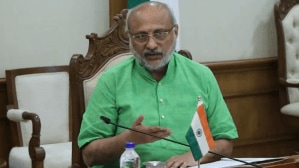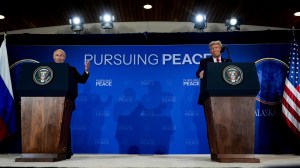Military Digest: Hardly any generalship or operational art was on display in Kargil, says former deputy chief of Army Staff
During the 'Kargil at 25' seminar, Lt. Gen. Satish Nambiar (retd) said the successful eviction of Pakistani intruders was due to the courage of junior leadership and soldiers.
 “We did not take the battle to the Pakistanis by hitting them hard in the depth areas where it would have hurt them. Or by opening on other fronts as was done by then PM Lal Bahadur Shastri in September 1965,” said Lt Gen Nambiar. (Express Archives)
“We did not take the battle to the Pakistanis by hitting them hard in the depth areas where it would have hurt them. Or by opening on other fronts as was done by then PM Lal Bahadur Shastri in September 1965,” said Lt Gen Nambiar. (Express Archives)Candid views on the Kargil conflict continue to be made in various forums and in writings by veteran Army and Air Force officers in the aftermath of the 25th-anniversary commemorations of the Kargil Vijay Divas.
Continuing in the same vein, former deputy chief of Army Staff Lt Gen Satish Nambiar (retd) has opined that with a couple of honourable exceptions, there was hardly any generalship involved in conducting military operations in Kargil. He also said there was no display of strategy or operational art.
 Former deputy chief of Army Staff Lt Gen Satish Nambiar (retd)
Former deputy chief of Army Staff Lt Gen Satish Nambiar (retd)
His remarks were made at a seminar held at the India International Centre (IIC) in New Delhi on August 1. In addition to the General, the seminar – titled ‘Kargil at 25’ – was attended by Commodore Uday Bhaskar (retired), a well-known writer on strategic affairs, former diplomat and foreign secretary Shyam Saran, and senior journalist Sushant Singh.
“We did not take the battle to the Pakistanis by hitting them hard in the depth areas where it would have hurt them. Or by opening on other fronts as was done by then PM Lal Bahadur Shastri in September 1965,” said Lt Gen Nambiar. He attributed the success in evicting the Pakistani intruders to the bravery of junior leadership and soldiers.
He stated that it was a time for Army colleagues to reflect on the lessons learned from Kargil and to contextualise national and military strategy, operational concepts, and organisational structures.
“Operations conducted in the Kargil sector after the ingress by the Pakistani military came to light were an outstanding military achievement by the Indian armed forces’ junior leadership and the men they were privileged to lead into battle,” he said.
“To attack enemy-held positions at forbidding heights ranging from 15,000 to 18,000 feet in many cases in hand-to-hand fighting and restore the status quo along the Line of Control was an achievement that will be recalled when military tactics are reviewed and studied,” he added.
He added that the current senior military leadership, who were mainstays at Kargil, would do well to recall what they were put through so that next time, there will be a better playing field than Kargil.
“My plea to the senior officers in uniform is, do not put out our youngsters in a Kargil-like situation. Make sure that, unlike in Kargil, they are given an even chance in dealing with adversaries,” he said.
Commodore Uday Bhaskar commented that over the last 20 years, a dominant narrative has emerged around Kargil, particularly in how young soldiers have been glorified. However, he suggests that the country should explore other aspects of the narrative more extensively.
Commodore Bhaskar stated that there have been lapses, including intelligence failures and an inability to assess, as he listed the number of soldiers killed in various operations from 1971 until the Galwan incident in 2020.
“What is this recurring inadequacy in higher security management? Each time, we are surprised as a nation, and there is a high human cost… Could we have done better, given the number of soldiers killed? Were there inadequacies of generalship? Have we looked at generalship objectively in the public domain?” he questioned.
He also mentioned that the Batalik sector in the Kargil conflict accounted for 40 per cent of gallantry awards, yet the commander of that brigade was not given a gallantry award.
—-







